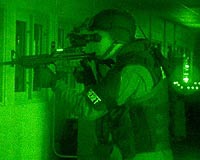| . |  |
. |
Washington (UPI) Jun 5, 2009 The Russian government doesn't believe that military forces should be reduced in the coming decades, unlike American liberals, but it does believe in global warming, unlike many American conservatives. The combination of these two views has resulted in the development of a long-term program for the next 12 years to boost Russia's security forces and military presence in the resource-rich Arctic Ocean. The Kremlin has plans to slowly assemble a collection of military and security units in the arctic region, but it has no intention of militarizing the arctic, a spokesman for the Russian Security Council announced March 27. The official, speaking on condition of anonymity, told RIA Novosti the Russian Security Council had published an official policy paper on its Web site titled "The fundamentals of Russian state policy in the Arctic up to 2020 and beyond." That policy paper gave a revealing insight into Russian grand strategy and official thinking about the development of the world in the coming decades. Russia is potentially highly vulnerable in the coming years. At a time when the global population continues to expand to record levels, Russia's is imploding. Its population is believed to be around 140 million and actually diminishing, due to very low birth rates, relatively high death rates, especially for middle-aged males, and an enormous number of abortions relative to the population every year. Russia is now believed to have a smaller population than the nation of Pakistan, or the single Indian state of Uttar Pradesh. It is also smaller than Nigeria's. Fifty years ago, these developments would have been regarded as inconceivable. While many of the major nations in the world may be driven to future wars to project power in order to assure increasingly scarce resources for their rapidly increasing populations, Russia has the opposite problem. It needs to protect and assure its resources in the face of potential challenges from more numerous and far more rapidly increasing populations around it. But the end result of this dilemma is clear, Russia is looking to maintain and increase the power of its armed forces and their capability to guard the nation's natural resources, especially in oil and gas. This year's policy paper described the principles guiding Russian policy in the arctic and said this would involve establishing significant Russian army, border and coastal guard forces there "to guarantee Russia's military security in diverse military and political circumstances," RIA Novosti said. "However, it does not mean that we are planning to militarize the arctic. We are focusing on the creation of an effective system of coastal security, the development of arctic border infrastructure, and the presence of military units of an adequate strength," the Security Council spokesman told RIA Novosti. The report cited unnamed government sources in Moscow as saying that this new Arctic Group of Forces would come under the jurisdiction of the Russian Federal Security Service, or FSB. The report also noted that the former head of the FSB, Nikolai Patrushev, is now the secretary of the Russian Security Council and was a forceful champion of Russia adopting an energetic, forward and "aggressive" state policy in the arctic. Share This Article With Planet Earth
Related Links The latest in Military Technology for the 21st century at SpaceWar.com
 US military technology easily shipped abroad: US audit
US military technology easily shipped abroad: US auditWashington (AFP) June 5, 2009 Sensitive military technology used in nuclear weapons and missiles can be bought easily in the United States and illegally exported abroad, a government audit has found. An undercover investigation by the Government Accountability Office (GAO) revealed that parts employed in atomic bombs, guided missiles, warplanes and improvised explosives could be purchased without difficulty and then ... read more |
|
| The content herein, unless otherwise known to be public domain, are Copyright 1995-2009 - SpaceDaily. AFP and UPI Wire Stories are copyright Agence France-Presse and United Press International. ESA Portal Reports are copyright European Space Agency. All NASA sourced material is public domain. Additional copyrights may apply in whole or part to other bona fide parties. Advertising does not imply endorsement,agreement or approval of any opinions, statements or information provided by SpaceDaily on any Web page published or hosted by SpaceDaily. Privacy Statement |